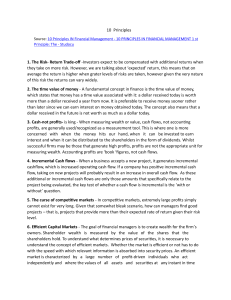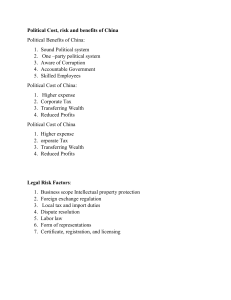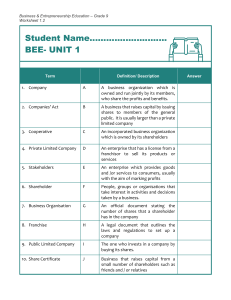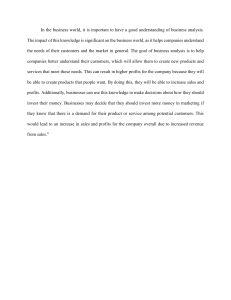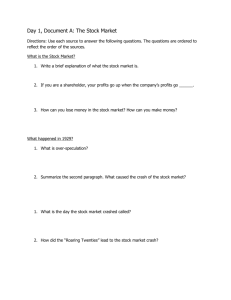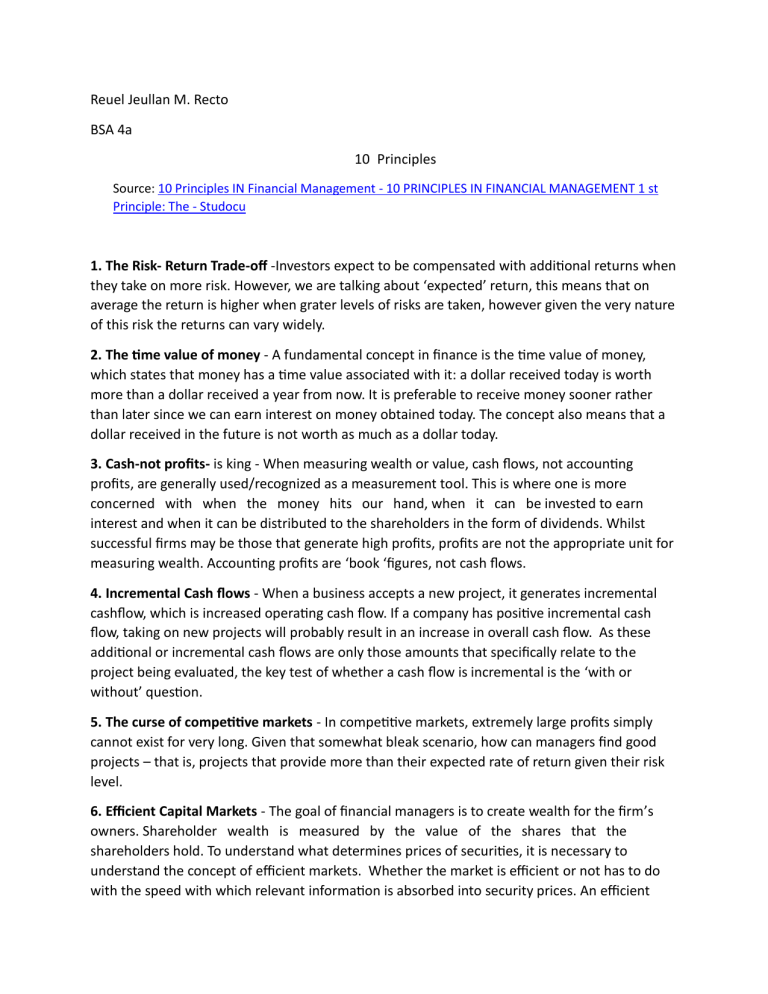
Reuel Jeullan M. Recto BSA 4a 10 Principles Source: 10 Principles IN Financial Management - 10 PRINCIPLES IN FINANCIAL MANAGEMENT 1 st Principle: The - Studocu 1. The Risk- Return Trade-off -Investors expect to be compensated with additional returns when they take on more risk. However, we are talking about ‘expected’ return, this means that on average the return is higher when grater levels of risks are taken, however given the very nature of this risk the returns can vary widely. 2. The time value of money - A fundamental concept in finance is the time value of money, which states that money has a time value associated with it: a dollar received today is worth more than a dollar received a year from now. It is preferable to receive money sooner rather than later since we can earn interest on money obtained today. The concept also means that a dollar received in the future is not worth as much as a dollar today. 3. Cash-not profits- is king - When measuring wealth or value, cash flows, not accounting profits, are generally used/recognized as a measurement tool. This is where one is more concerned with when the money hits our hand, when it can be invested to earn interest and when it can be distributed to the shareholders in the form of dividends. Whilst successful firms may be those that generate high profits, profits are not the appropriate unit for measuring wealth. Accounting profits are ‘book ‘figures, not cash flows. 4. Incremental Cash flows - When a business accepts a new project, it generates incremental cashflow, which is increased operating cash flow. If a company has positive incremental cash flow, taking on new projects will probably result in an increase in overall cash flow. As these additional or incremental cash flows are only those amounts that specifically relate to the project being evaluated, the key test of whether a cash flow is incremental is the ‘with or without’ question. 5. The curse of competitive markets - In competitive markets, extremely large profits simply cannot exist for very long. Given that somewhat bleak scenario, how can managers find good projects – that is, projects that provide more than their expected rate of return given their risk level. 6. Efficient Capital Markets - The goal of financial managers is to create wealth for the firm’s owners. Shareholder wealth is measured by the value of the shares that the shareholders hold. To understand what determines prices of securities, it is necessary to understand the concept of efficient markets. Whether the market is efficient or not has to do with the speed with which relevant information is absorbed into security prices. An efficient market is characterized by a large number of profit-driven individuals who act independently and where the values of all assets and securities at any instant in time fully reflect all available information. Implications of efficient markets for finance managers: first, the price is right. 7. The Agency Problem - Although the goal of the firm is the maximization of shareholder wealth, the agency problem may interfere with the implementation of this goal, particularly in large companies. The agency problem refers to the fact that a firm’s managers will not work to maximize benefits to the firm’s owners unless it is in the managers’ interests to do so. This is because of a separation of the management and the ownership of the firm. 8. Tax Bias business decisions- Hardly any decision is made by the financial manager without considering the impact of taxes. Governments also realize that taxes can bias business decisions and so they use taxes to encourage spending in certain ways i.e., via tax rebates. 9. All risk is not equal - Don’t put all your eggs in one basket’. Diversification allows good and bad events to cancel each other out and thus reduce risk. The risk relative to a project change depends on whether it is measured standing alone or together with other projects that the company may take on. If shareholders are diversified, they can eliminate part of the risk associated with movements in each company’s share price. 10. Doing the right thing is what ethical behavior refers to, although ethical dilemmas in finance are prevalent - Ethics in finance, or rather the lack of, is a recurring theme in both fact and fiction. Ethical behavior means ‘doing the right thing’. A difficulty arises, however, in attempting to define ‘the right thing’. The problem is that each person has his or her own set of values, which forms the basis for their personal judgements about what is right and what is wrong. But every civilization establishes a set of guidelines or laws that define what constitutes "doing the right thing."
